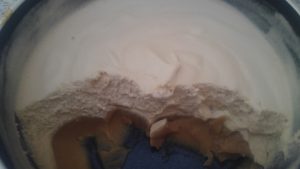My motivation for writing these posts spurred originally from the irritation of regularly hearing negative/ironic comments about Finnish food by Italian residing here. Comments in which following things are repeated: Italian food is much tastier, Finland is a young country with no gastronomical culture, there are no delicious dishes in this part of the world. Above all, the fact that Italian food often is good, is because of its fidelity towards culinary/gastronomical traditions developed during the centuries (this discourse would need a post on its own). What comes to our food, I remain firmly convinced that most of the Italians living in Finland (and most of the foreign citizens residing here) don’t have a clue of how much tasty food this country has to offer. I didn’t know that either, till autumn 2019.
My maternal granny died in 2001, that will say when I was 10 years old. I remember well that every time we visited her, there were always potatoes being served. Obviously I was too young to understand why she always served something with potatoes. My granny left as a heritage two cook books from 1940’s/50’s; those books are courtesy of my parents nowadays. In September 2019 I started browsing them because I wanted to find new ideas and inspirations for cooking. Reading them with attention I discovered loads and loads of fascinating information. In the following paragraph I will explain to you what we ate in the 1950’s.
Firstly, there was no pasta in Finland in the 50’s (except lumachette, the ones that Finns refer to as makaroner/makaronit). For the vast majority of the population, rice meant exclusively porridge rice; the sort you use for preparing rice porridge (sv. risgrynsgröt, fi. riisipuuro). Bread, porridge and potatoes were the main sources of carbohydrates together with fruit and vegetables. It was almost impossible to find bananas in the shops and oranges were “Christmas stuff”. For instance: my dad ate his first orange at the age of 7 when he was in hospital in Turku for appendix operation. And yes, strawberries, those ones you see on sale nowadays, were also very rare (in the cook books of my granny they are called “puutarhamansikka”, garden strawberry). The wild strawberries were much more common back then.
The first recipe is a simple dessert you can easily prepare at home. I swear, it’s worth trying:
Coffee jelly (fi. kahvihyytelö, sv. kaffegelé)
2,5 dl of coffee (corresponds to one regular coffee mug in Finland)
2,5 dl of cream
5 gelatine leaves
1 tablespoon of sugar
Soak the gelatine leaves in cold water for at least 5 minutes. Prepare the coffee. Squeeze out the excess water out of the gelatine leaves. Add the sugar and the gelatine leaves to the coffee. Whip the cream. Mix the cream to the coffee slowly. Conserve in the fridge for at least one hour before serving.

Smaklig måltid! – Hyvää ruokahalua! – Buorre borranlusttu! – Pyeri puurrâmlusto! – Šiõǥǥ poorrâmhaal!
For further information:
Arpiala, et.al: Uusi keittokirja – uusia ruokia ja vaihtelua vanhoihin. Kirjasampo. 1946.
Kotiruoka. Otava. 1950.
– Pekka